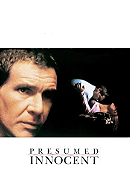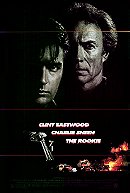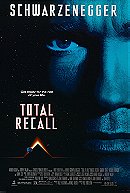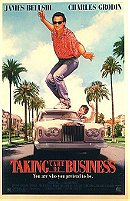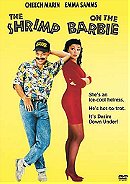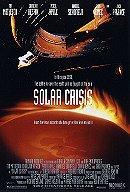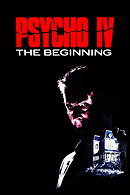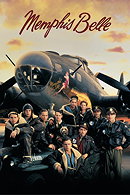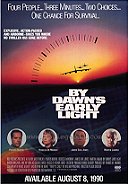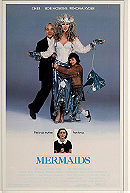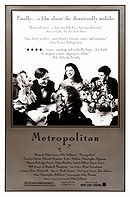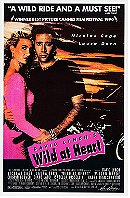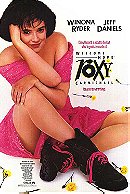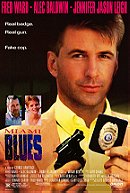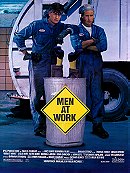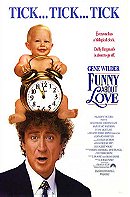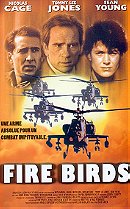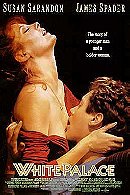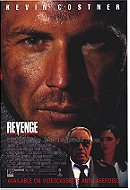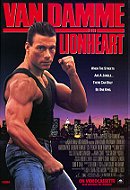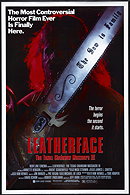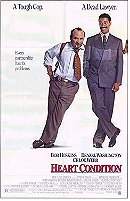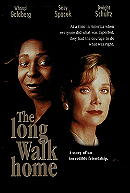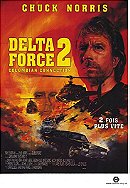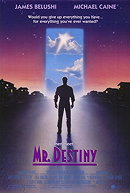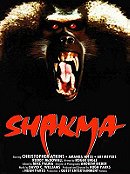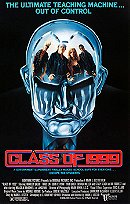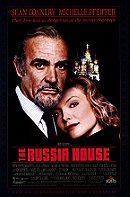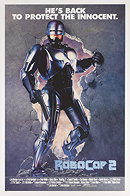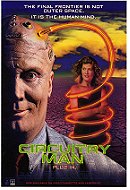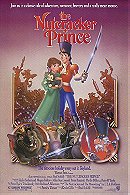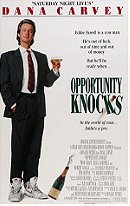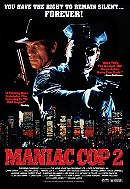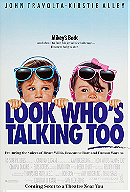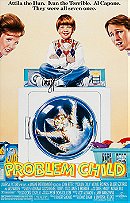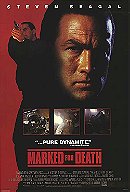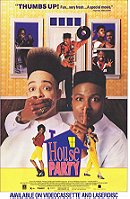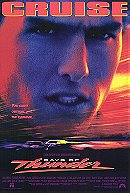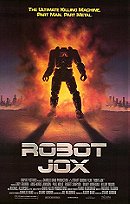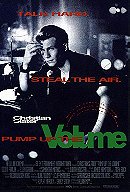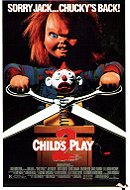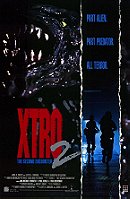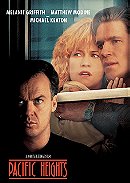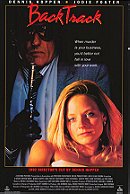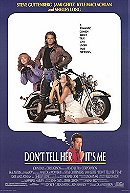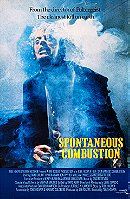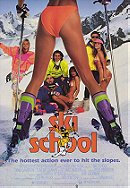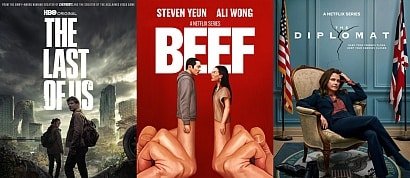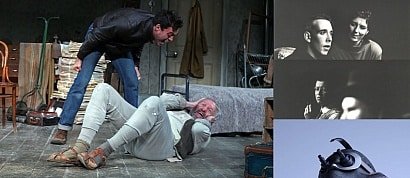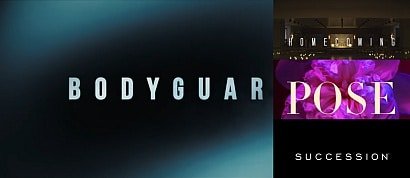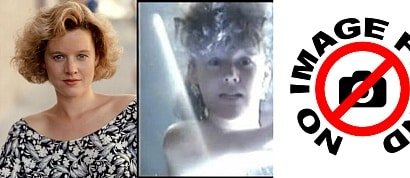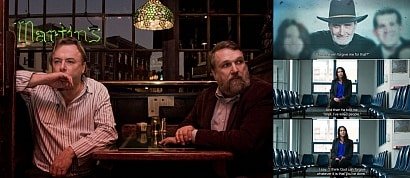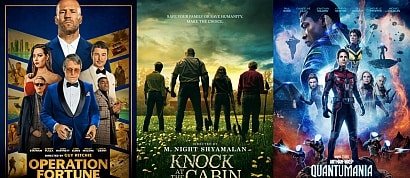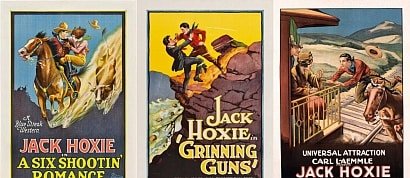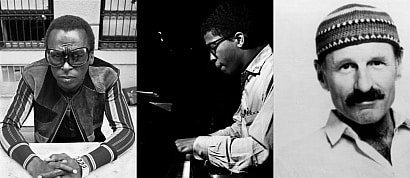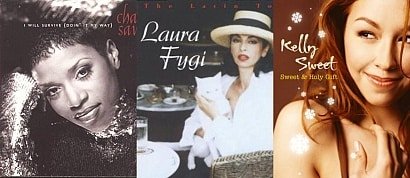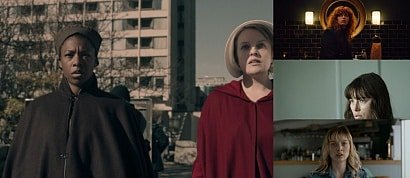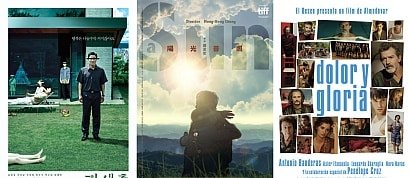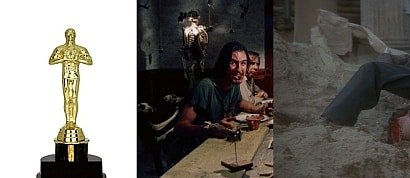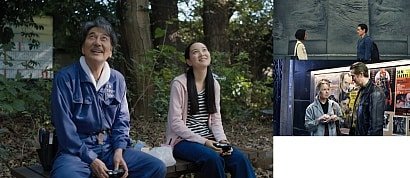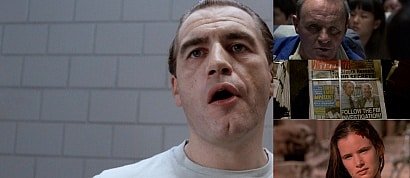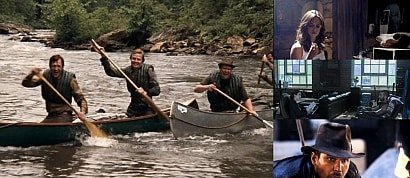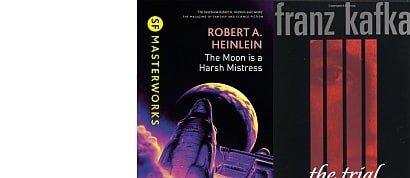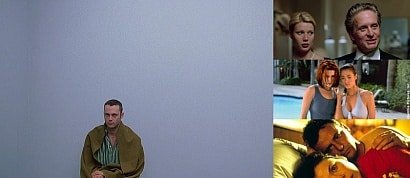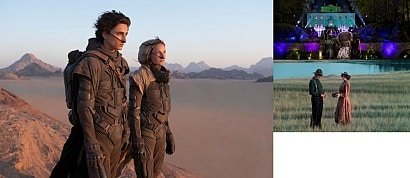24
4059 Views Share:
Pop Culture Phenomenon Films: 90’s
Movie list created by Agent Kermit D. Fonz 
Sort by:
Showing 1-50 of 1883
Decade:
Rating:
List Type:
 Add items to section
Add items to section
1990
Repossessed (1990)

It's been some time since Father Jebedaiah Mayii exorcised the devil from little Nancy Aglet, but now Nancy has grown up and has a family, the demon returns and repossesses Nancy.
With Father Mayii unwilling to help, Father Luke Brophy tries his best to help Nancy, even when TV's Ernest Weller plans to air the exorcism live on TV.
Repossessed is a 1990 American comedy film that parodies the 1973 horror film, The Exorcist. It was written and directed by Bob Logan.
The film features the original star of The Exorcist, Linda Blair, as well as Leslie Nielsen and Anthony Starke.
Many gags parodied events in The Exorcist, such as the green-vomit and head-spinning scenes, and real-life events such as the televangelist scandals of the 1980s.
It’s an overall turkey, and critics wanted it to be sent back to the very pits of Hell, from which it came.
The film received a limited theatrical release in the United States by New Line Cinema in September 1990.
The film was released on VHS and laserdisc by LIVE Home Video the same year.
Ned Beatty also starred in Exorcist II: The Heretic, though he shared no scenes with Linda Blair in that film.
Repossessed, also featured earlier performances by Julie Strain and Willie Garson, and cameos by Jesse “The Body” Ventura and Mean Gene Okerlund.
The film won a Razzie Award, the Golden Raspberry Award for Worst Original Song, for the song "He's Comin' Back (The Devil!)".
There was the song, “Repossessed” performed by Cindy Valentine, on the soundtrack, as well.
At the same time, the film The Exorcist IiI was released in theatres.
Agent Kermit D. Fonz's rating:



Presumed Innocent is a 1990 American legal thriller film based on the 1987 novel of the same name by Scott Turow. Directed by Alan J. Pakula, and written by Pakula and Frank Pierson, it stars Harrison Ford, Brian Dennehy, Raúl Juliá, Bonnie Bedelia, Paul Winfield and Greta Scacchi.
The film follows Rusty Sabich, a prosecutor who is charged with the murder of his colleague and mistress Carolyn Polhemus. This is the first film role for Jeffrey Wright.
It also featured earlier performances by Jesse Bradford, Jeffrey Wright, John Seitz, Tucker Smallwood, Christine Estabrook, Anna Maria Horsford, Bradley Whitford, Joe Girfasi, John Spenser, Greta Scacchi, and Paul Winfield.
It was followed by the mini series, “The Burden of Proof” and the made for TV film, “Innocent”, and a upcoming TV series.
Presumed Innocent grossed $86,303,188 during its North American theatrical run. Coupled with its international take of $135 million, it accumulated $221,303,188 in worldwide box office totals.
In North America, it was the twelfth highest-grossing film of 1990,[25] and the fourth highest-grossing R-rated film released that year.
Worldwide, it was the eighth highest-grossing film of 1990,[27] as well as Warner Bros.' highest-grossing film that year.
The movie was also filmed in Windsor, Ontario, Canada.
Agent Kermit D. Fonz's rating:


The Rookie (1990)

The Rookie is a 1990 American buddy cop action drama thriller film directed by Clint Eastwood, written by Boaz Yakin and Scott Spiegel, and produced by Howard G. Kazanjian, Steven Siebert, and David Valdes.
The film stars Eastwood, Charlie Sheen, Raul Julia, Sônia Braga, Lara Flynn Boyle, and Tom Skerritt.
Eastwood plays a veteran police officer teamed up with a younger detective played by Sheen (the rookie), whose intent is to take down a German crime lord in downtown Los Angeles, following months of investigation into an exotic car theft ring.
Veteran cop Nick Pulovski is used to playing musical partners; many of the partners he’s had in the past have died on the job, and often as a result of Nick’s risky tactics.
But the rookie who’s been assigned to help Nick bust a carjacking ring is almost as hotheaded as he is … and when Nick gets kidnapped, his newbie partner is his only hope.
Critics, felt it was not exactly one of Clint Eastwood’s best films.
Audiences wanted The Rookie, to hand in it’s badge.
The film featured a early performance, by Lara Flynn Boyle, and one by Xander Berkeley.
The movie, was made for $30 million, and garnered $21.6 million. Foiled by Kevin McCallister in theatres!
Agent Kermit D. Fonz's rating:


Total Recall (1990)

Douglas Quaid is haunted by a recurring dream about a journey to Mars. He hopes to find out more about this dream and buys a holiday at Rekall Inc. where they sell implanted memories.
But something goes wrong with the memory implantation and he remembers being a secret agent fighting against the evil Mars administrator Cohaagen.
Now the story really begins and it's a rollercoaster ride until the massive end of the movie.
Based on the short story, “We Can Remember It For Wholesale” by Phillip K. Dick, it was one of many adaptations of Dick’s short stories.
Total Recall, blew everyone’s mind when it was in theatres, and critics as well.
Considered, to widely subversive and hyperbole film, and one of the best sci films, ever.
So much so, that not even a TV show or a remake could touch it.
Total Recall, was also one of the biggest hits of 1990.
Featuring performances by Dean Norris, and Rosemary Dunsmore, and with effects work by Rob Bottin, Eric Brevig, Henry Alvarez, Anthony Allen Barlow, and Jennifer Ann Barnes.
Made for $48–80 million, it garnered $261.4 million.
Agent Kermit D. Fonz's rating:


Taking Care of Business (1990)

Taking Care of Business (released theatrically in the United Kingdom as Filofax) is a 1990 American comedy film directed by Arthur Hiller and starring James Belushi and Charles Grodin.
It is named after the song of the same name by Randy Bachman, recorded by the Canadian rock group Bachman–Turner Overdrive.
The film is also known for being the first screenplay work written by J. J. Abrams, who later went on to make several blockbuster films, including Super 8 and Star Wars: The Force Awakens.
Written by a pre Lost, J.J. Abrams, Jimmy Dworski is a criminal serving the last 48 hours of a jail sentence. He wins a couple of baseball tickets by calling a radio quiz show. With help of other inmates, he escapes to go watch the game.
When by chance he finds the Filofax of executive Spencer Barns who loses it while traveling on a business weekend. Jimmy finds cash, credit cards and the key to a big mansion.
He jumps on the opportunity and starts posing as Barns. While the real Barnes is trying to find his Filofax he gets in all sorts of trouble. How will things turn out when the two finally meet?
Interesting fact, the Chicago Cubs, the team playing in the World Series in the film had been in the National League playoffs after filming began on this film.
They had lost to the San Francisco Giants in 5 games and they would not return to the World Series until 2016 when they finally won after 108 years.
The film didn’t receive great reviews, and was a adequate success film in theatres.
Also, John de Lancie and Gates McFadden, from Star Trek: The Next Generation are also in this movie.
Agent Kermit D. Fonz's rating:


The Shrimp on the Barbie (1990)

Carlos failed in the show-biz and currently works as waiter in a Mexican restaurant. There he meets Alex (Emma Samms) and dumb footballer Bruce, who celebrate their engagement with her parents.
Alex' father is less than thrilled of her fiancée and says he'd rather accept anybody else. Eventually Alex hires Carlos to present him as her new fiancée. But her father sees through the game.
The film, featured a earlier performance by Noel Appleby.
In the United Kingdom, the title was changed to "The Boyfriend from Hell", because Mattel owned the name and trademark Barbie.
It featured music by Herbs, Willie Hona, Hattie and the Hounds, and Abby Rhodes.
The film was made for $5.5 million, and garnered $458,996.
Directed by Alan Smithee, the alias for Michael Gottlieb.
Solar Crisis (1990)

Solar Crisis is a 1990 Japanese-American co-production science fiction thriller film directed by Richard C. Sarafian (credited as Alan Smithee).
The screenplay was written by Joe Gannon and Tedi Sarafian (credited as Crispan Bolt), based on the 1990 novel Crisis 2050 by Takeshi Kawata, who co-produced the film.
The film was first released in Japan in 1990, and in the United States in 1992.
The cast features Tim Matheson as Steve Kelso, Charlton Heston as Adm. "Skeet" Kelso, Peter Boyle as Arnold Teague, Annabel Schofield as Alex Noffe, Corin Nemec as Mike Kelso and Jack Palance as Travis.
The executive producers were Takeshi Kawata and Takehito Sadamura. FX cinematographer Richard Edlund and veteran sound editor James Nelson were its producers.
A huge Solar flare is predicted to fry Earth. Astronauts must fly to the sun to drop a talking bomb (Freddy) at the right time so the flare will point somewhere else.
Giant IXL Corp C.E.O. Teague thinks the flare won't happen and wants the mission to fail so he can buy the planet cheaply while the scare lasts.
Employee Haas prepares a surprise for the astronauts. While daddy Steve Kelso commands the space ship where temperatures rise, granddaddy Admiral Skeet Kelso is searching the desert for grandson Mike who's gone A.W.O.L. to say goodbye to his dad but who inadvertently crossed the path of the men from IXL after meeting desert-dweller Travis.
It was made for $56 million.
Psycho IV: The Beginning (1990)

Psycho IV: The Beginning is a 1990 American made-for-television slasher film directed by Mick Garris, and starring Anthony Perkins, Henry Thomas, Olivia Hussey, Warren Frost, Donna Mitchell, and CCH Pounder.
It serves as both the third sequel and a prequel to Alfred Hitchcock's Psycho, focusing on the early life of Norman Bates.
It includes both events after Psycho III while focusing on flashbacks of events that took place prior to the original film. It is the fourth and final film in the original Psycho franchise, and Perkins' final appearance in the series before his death in 1992.
The film was written by Joseph Stefano, who also wrote the screenplay of the original film.
The musical score was composed by Graeme Revell and the title theme music by Bernard Herrmann from the original film was used. Psycho IV: The Beginning premiered on Showtime on November 10, 1990 as part of a Psycho retrospective hosted by Janet Leigh.
The film, featured a pre Twin Peaks performance by Warren Frost, and a cameo by John Landis, there a forgettable movie for TV film, called Bates Motel, the controversial Psycho remake, and the TV series, Bates Motel.
Agent Kermit D. Fonz's rating:


Memphis Belle (1990)

Memphis Belle is a 1990 British-American war drama film directed by Michael Caton-Jones and written by Monte Merrick. The film stars Matthew Modine, Eric Stoltz, and Harry Connick Jr. (in his film debut). Memphis Belle is a fictional version of the 1944 documentary Memphis Belle:
A Story of a Flying Fortress by director William Wyler, about the 25th and last mission of an American Boeing B-17 Flying Fortress bomber, the Memphis Belle, based in England during World War II.
The 1990 version was co-produced by David Puttnam and Wyler's daughter Catherine and dedicated to her father. The film closes with a dedication to all airmen, friend or foe, who fought in the skies above Europe during World War II.
The film garnered mixed reviews from critics.
The film opened in the UK on 266 screens and grossed £1,174,250 in its opening week, ranking number one at the box office.
It was number one in its second week too. It went on to gross £4,924,000 in the UK.
Agent Kermit D. Fonz's rating:



By Dawn's Early Light is an HBO original movie, first aired in 1990. It is based on the 1983 novel Trinity's Child, written by William Prochnau.
It aired on May 19, 1990.
In 1990, James Earl Jones was nominated for an Emmy for Outstanding Supporting Actor in a Miniseries or a Special and Matte World Digital won for Outstanding Achievement in Special Visual Effects.
In addition, Martin Landau was nominated for the 1991 Cable Ace award for Best Supporting Actor in a Movie or Miniseries, but lost to his co-star from this film, James Earl Jones who won for Heat Wave.
It also featured earlier performances by Ken Jenkins, and Jeffrey DeMunn.
Mermaids (1990)

Mermaids is a 1990 American family comedy-drama film directed by Richard Benjamin, and starring Cher, Bob Hoskins, Winona Ryder, Michael Schoeffling, and Christina Ricci in her film debut.
Based on Patty Dann's 1986 novel of the same name, and set in the early 1960s, its plot follows a neurotic teenage girl who moves with her wayward mother and young sister to a small town in Massachusetts.
Fifteen-year-old Charlotte Flax is tired of her wacky mom moving their family to a different town any time she feels it is necessary.
When they move to a small Massachusetts town and Mrs. Flax begins dating a shopkeeper, Charlotte and her 9-year-old sister, Kate, hope that they can finally settle down.
But when Charlotte’s attraction to an older man gets in the way, the family must learn to accept each other for who they truly are.
Released in December 1990, Mermaids was met with critical acclaim, particularly for the performance of Ryder, who received a Golden Globe Award nomination and a National Board of Review Award. Ricci also won a Young Artist Award for her performance.
The film’s soundtrack featured from the 50’s, and a cover “The Shoop Shoop Song (It's in His Kiss)” by Cher.
Over the years, Mermaids has been considered to be one of the best depictions of a mother daughter relationship, and everything that comes with it.
It was made for $20 million, and garnered $35.4 million.
Agent Kermit D. Fonz's rating:


Metropolitan (1989)

Metropolitan is a 1990 American romantic comedy-drama film produced, written and directed by Whit Stillman, in his feature directorial debut.
The film concerns the lives of a group of wealthy young socialites during debutante season in Manhattan.
In addition to some of their debutante parties, it covers their frequent informal after-hours gatherings at a friend's Upper East Side apartment, where they discuss life, philosophy and their fate; form attachments, romances and intrigues; and react to an interesting but less well-to-do newcomer.
In a Manhattan apartment a couple of friends from the New York upper-class meet almost every night to talk about social mobility, play bridge, and discuss Fourier's socialism; the cynic Nick, the philosophical Charlie, partygirl Sally and austenite Audrey. They are joined by Tom.
His background is much simpler and he is critical of their way of life. But he finds a soulmate in Audrey, who without his knowledge falls in love with him.
Metropolitan, was one of the first films directed by Walt Stillman, and also a critical success.
The film grossed $2.9 million in the United States and Canada and $7 million worldwide.
With songs by Brenda and the Tabulations, Barbara Mason, and Jack Davis.
Agent Kermit D. Fonz's rating:



Sibling Rivalry is a 1990 American black comedy film directed by Carl Reiner and starring Kirstie Alley, Sam Elliott, Jami Gertz, Bill Pullman, Carrie Fisher, and Scott Bakula.
Marjorie Turner is suffocating. Her younger sister Jeanine has no ambition, and her eight-year marriage to Harry puts her in constant competition with his family (all doctors), with whom he too is competing for affections.
One day she snaps while food shopping and beds a mysterious man who dies right afterward. When she forgets her wallet, a vertical-blinds salesman finds it and things really get complicated from there.
Notable, for being the first solo starring film to star Kristie Alley, critics gave it less than stellar reviews, with the movie bombing in theatres.
Sadly, both Kristie Alley and Carrie Fisher passed away years later.
The film’s soundtrack featured songs by Dwight Yoakam, Lyle Lovett, and Joan Armatrading.
In his review, Roger Ebert wrote, "The screenplay is founded on the ageless principles of screwball comedy, but the film lacks the energy, the timing and the sense of manic frenzy that's generated by the best screwball."
Sibling Rivalry was released on October 26, 1990 in 1,448 theatres.
It opened at #2 at the box office, grossing $4 million in its opening weekend.
It stayed at #2 in its second weekend grossing $8.424.402. After three months in theatres, the film went on to gross $17,854,933 in its theatrical run.

Wild at Heart is a 1990 American romantic crime drama film written and directed by David Lynch, based on the 1989 novel of the same name by Barry Gifford.
Starring Nicolas Cage, Laura Dern, Willem Dafoe, Crispin Glover, Diane Ladd, Isabella Rossellini, and Harry Dean Stanton, the film follows Sailor Ripley and Lula Fortune, a young couple who go on the run from Lula's domineering mother and the criminals she hires to kill Sailor.
If Lula knows one thing in this world, it's that she's destined to be with her ex-con boyfriend Sailor - no matter how many times her mama tries to kill him.
But when she and Sailor finally hit the road in a desperate bid to find happiness, their journey plunges them into a disturbing underworld filled with sexual secrets and dangerous desires that form a terrifying "tapestry of human extremity”.
Based on the book “Wild at Heart: The Story of Sailor and Lula” by Barry Gifford, the film did decently wit critics, with audiences not going wild for it.
There is also the soundtrack, and the song “Wicked Game” by Chris Issak, and the film itself ended up getting Best Picture at the Cannes Films Festival.
Despite mixed initial reviews, Wild at Heart came to be viewed favorably in subsequent years.
It was ranked the 47th best film of the 1990s in an IndieWire critics' poll,[33] the 26th greatest film of the same period in a Complex poll, and the 53rd best in Rolling Stone's poll.
Wild at Heart opened in the United States on August 17, 1990, in a limited release of only 532 theaters, grossing US$2,913,764 in its opening weekend.
It went into wide release on August 31 with 618 theaters and grossing an additional $1,858,379. The film ultimately grossed $14,560,247 in North America.
Agent Kermit D. Fonz's rating:



Welcome Home, Roxy Carmichael is a 1990 American comedy-drama film directed by Jim Abrahams and starring Winona Ryder and Jeff Daniels.
Although Roxy left town more than fifteen years ago, her memory has never faded. Her expected return starts to impact a number of lives, including that of her former partner Denton Webb.
But it is Dinky, the adopted daughter of the Bossettis and ignored by most of her classmates as a strange loner, who may be most changed. She is convinced she is Roxie's secret child.
The film garnered mixed reviews, and underperformed at the box office.
The film’s soundtrack included songs by Melissa Etheridge.
With appearances by Laila Robins, Joan McMurtrey,
Stephen Tobolowsky, Heidi Swedberg, Carla Gugino, Beth Grant, and Ron Perkins.
Roger Ebert gave the film 2 stars in his original review, and said that "Welcome Home, Roxy Carmichael" contains one small treasure: a perceptive and particular performance by Winona Ryder in the role of a high school outcast", and that "her work is surrounded by a screenplay so flat-footed that much of our time is spent waiting impatiently for foregone conclusions."
Miami Blues (1990)

Miami Blues is a 1990 American neo-noir black comedy crime drama film directed by George Armitage, based on the novel of the same name by Charles Willeford.[
It stars Alec Baldwin, Fred Ward (who also served as an executive producer) and Jennifer Jason Leigh.
Fake badge, real gun. Alec Baldwin, plays a criminal on the run, who steals a cop’s badge, teeth, and gun, and uses it to pretend to be a cop, while the real cop, played by Fred Ward, how wants to see him arrested.
With Jennifer Jason Leigh, as the girl who he falls in love with, who later finds out about his secret.
Based on the novel by Charles Willeford, the film got decent reviews from critics, and did okay at the box office, with the film becoming a cult hit years later.
The film’s soundtrack featured songs by Norman Greenbaum, Highway 101, The Forester Sisters, and others.
The film's release was delayed to try to take advantage of Baldwin's success in The Hunt for Red October, which had been released two months earlier, but failed to do so, with an opening weekend gross of $3 million from 832 screens to place fourth for the weekend, behind The Hunt for Red October.
It went on to gross $9.9 million in the United States and Canada.
Agent Kermit D. Fonz's rating:


Men at Work (1990)

Men at Work is a 1990 American action comedy thriller film written and directed by Emilio Estevez, who also starred in the lead role.
The film co-stars Charlie Sheen, Leslie Hope and Keith David. The film was released in the United States on August 24, 1990.
Two garbage men find the body of a city councilman in a trash can on their route. With help from a supervisor, the duo must solve the case and find the man’s killer while hiding the body from the cops.
Considering its relatively small production budget, Men at Work did well in theaters, grossing US$16,247,964, with $3,184,311 of that grossed within the first week.
The critical reception for the film was negative. Men at Work currently holds a 30% rating on Rotten Tomatoes based on 27 reviews.
The film’s soundtrack featured songs by UB40, Stewart Copeland, Sly & Robbie, and many others.
Agent Kermit D. Fonz's rating:



Directed by Leonard Nimoy, and based on a article by Bob Greene and is about a New York cartoonist named Duffy Bergman who marries gourmet chef Meg Lloyd. Meg wants to have a baby.
Duffy agrees, but after unsuccessful attempts, Duffy encourages her to focus on her career and come back to the child issue later. After his mother's death, however, Duffy becomes fixated on wanting to have a child.
Meg no longer sees this as a priority, as she's trying to open her own restaurant. The two start to have marital problems, leading to a separation.
First of two consecutive flops at the box office for Gene Wilder, whose next picture Another You was also a financial failure.
With earlier performances by Mary Stuart Masterson, Stephen Tobolowsky, David Margulies, and Mendi Malick, with cameos by Regis Philbin, and Patrick Ewing.
Robert quoted that “Funny About Love provides an opportunity to spend 101 minutes in the presence of the most cloying, inane and annoying dialogue I've heard in many a moon, punctuated only by occasional lapses into startling bad manners.[“
Gene Siskel was also scathing in his review on Siskel and Ebert’s show At the Movies, remarking that unusually for him, during the screening of the film he stood up in horror at one scene taking place at a sporting event, and said to Ebert: “I’ve seen it all.”
Funny About Love opened in 1,213 theaters on September 21, 1990 and grossed $3,036,352 in its opening weekend, landing at #5, behind Goodfellas, Postcards from the Edge's second weekend, Ghost's eleventh, and Narrow Margin.
The film would eventually gross $8,141,292 in the domestic box office.
Agent Kermit D. Fonz's rating:



Fire Birds (released under the alternative title Wings of the Apache) is a 1990 American military action film directed by David Green and produced by William Badalato, Keith Barish and Arnold Kopelson.
The storyline was conceived by retired Lt. Colonels Step Tyner and John K. Swensson and retired Marine Capt. Dale Dye[2] and developed into a screenplay written by Paul F. Edwards, Nick Thiel and uncredited David Taylor.
The film stars Nicolas Cage, Tommy Lee Jones and Sean Young. Cage is cast as a helicopter pilot attempting to help dismantle a drug cartel in South America.
Jones plays his pilot instructor and senior ranked military officer during his flight training, while Young portrays his love interest.
The U.S. Government is willing to help any country that requires help in ridding themselves of drugs with support from the Army. Unfortunately, the drug cartels have countered that offer by hiring one of the best air-combat mercenaries and have armed him with a Scorpion attack helicopter.
The army decides to send in its best people from its Apache Air Combat school. But first they have to be taught how to fly air-to-air combat missions.
It’s like Top Gun, but with a Phil Collins soundtrack, and being a critical dud and shot down by audiences.
Made for $22 million, it garnered $14,760,45.
The soundtrack featured songs by Phil Collins, including “Find A Way To My Heart” and music composed by David Newman.
Agent Kermit D. Fonz's rating:


White Palace (1990)

White Palace is a 1990 American erotic romantic drama film directed by Luis Mandoki. It stars Susan Sarandon, James Spader, Jason Alexander, Kathy Bates, Steven Hill, Jeremy Piven, and Renee Taylor.
It was written by Ted Tally and Alvin Sargent, based on the novel of the same name by Glenn Savan (who appears in the film as an extra with a small speaking part).
It centers on the unlikely relationship between a young upper middle class widower who falls in love with a middle-aged working class waitress in St. Louis, Missouri.
The original music score was composed by George Fenton. The film is marketed with the tagline "The story of a younger man and a bolder woman".
The film featured Kim Myers, Jonathan Penner, Rachel Chagall, Maria Pitillo, and Jeremy Piven, in roles, the movie garnered $17,487,53.
It also featured music by The Bottom Line, K.T. Oslin, Slater Sealove Band, and others.
Revenge (1990)

Based on the novella, by Jim Harrison, Michael "Jay" Cochran has just left the Navy after 12 years. He's not quite sure what he will do now, except that he knows that he wants a holiday.
He decides to visit Tiburon Mendez, a powerful but shady Mexican businessman whom he once flew to Alaska for a hunting trip. Arriving at the Mendez mansion in Mexico, he is immediately surprised by the beauty and youth of Mendez's wife Miryea.
Their attraction to each other is undeniable, but Cochran is aware that Mendez is a powerful, vindictive, and very possessive man who does not tolerate betrayal.
Critics wanted revenge against Revenge. So did audiences.
The film featured a early performance by John Leguizamo,
21 years after the film 'Revenge', Madeleine Stowe would go on to star in the TV series called Revenge.
And also, this movie, which stars Kevin Costner, is based on a novella by Jim Harrison. JFK, which also stars Kevin Costner, is based on a novel by Jim Garrison.
Agent Kermit D. Fonz's rating:


Lionheart (1990)

Lyon Gaultier is a deserter in the Foreign Legion arriving in the USA entirely hard up. He finds his brother between life and death and his sister-in-law without the money needed to heal her husband and to maintain her child.
To earn the money needed, Gaultier decides to take part in some very dangerous clandestine fights.
The film was a critically meh film, especially given that critics normally are not big fans of Jean Van Damme films anyways.
The film was a also a marginally decent film, in theatres.
Ashley Johnson, also made a early performance, in the film.
Lionheart’s soundtrack, featured music by Bill Wray, Merry Clayton, and others.
The film premiered in France on August 1, 1990, and opened in the U.S. on January 11, 1991.
It received lackluster reviews, but marked Van Damme's breakthrough as a theatrical leading man in North America.
It was released in the United Kingdom as A.W.O.L: Absent Without Leave, and in Australia and New Zealand as Wrong Bet, two early titles considered by the producers.
The film, was budgeted at $6 million, and made $24 million domestically.
Agent Kermit D. Fonz's rating:



A couple from California, meets Leatherface and his family of cannibals, can they survive the chainsaw and the massacre that follows? Along the way, a survivalist comes across their way. Is he doomed as well?
Among others, one of New Line's first choices for director was Peter Jackson, also approached were Iohn McNaughton and Tom Savini.
Viggo Mortensen, had one of his earliest performances in this film, and became a cult film years later.
The film was distributed by New Line Cinema, who bought the rights to the series from The Cannon Group after producing The Texas Chainsaw Massacre 2. Initially, this film was given an X-rating by the Motion Picture Association of America, which limited the studio's release possibilities.
After the studio made cuts, it was re-rated R, and New Line released it on January 12, 1990. It was refused classification in the UK upon its initial release. It has since been released on home video in both unrated and rated versions, and a cut version was accepted with an 18 certificate in the UK.
The film was both a critical and commercial failure, grossing $5.7 million at the US box office, making it the poorest performing film in the series at the time, until the release of its sequel Texas Chainsaw Massacre: The Next Generation in 1995.
Shooting took place in Valencia, California at the end of July 1989. The director intended to film on 16 mm in Texas, but set construction had already begun in California prior to Jeff Burr signing on.
Tom Savini and Peter Jackson were considered to direct before Jonathan Betuel was eventually hired as director.
Peter Jackson, would later go to direct The Lord of the Rings, with Viggo Mortensen as Aragon, for New Line Cinema.
Betuel departed the project for unstated reasons leading to the studio hiring Stepfather II filmmaker Jeff Burr to direct the film.
Songs in the film’s soundtrack, were performed by Hurricane, Laaz Rockit, and Death Angel.
With make up effects, by Greg Nicotero, Howard Berger, and Robert Kurtzman.
Agent Kermit D. Fonz's rating:


Heart Condition (1990)

Jack Moony, a white cop, has it in for a black lawyer to the drug crowd, Napoleon Stone.
That Stone is now dating his ex-girlfriend doesn't help matters at all. Stone is shot after Moony suffers a heart attack and wakes to find that he not only has a new heart, but that it is Stone's and that Stone's ghost is now his constant companion.
Stone is insistent that Moony not only take care of his heart now but that Moony solve his murder.
It was long rumored that Denzel Washington was allegedly talked into making this film by his agent. He also allegedly fired him shortly afterwards because of how terrible the reception for it was.
However, in 2017 Washington's publicist was asked about this "fact" in a story on the movie at 'The Ringer' and stated for the record that the rumor was not and never had been true.
It was also the debut theatrical feature film directed by television director James D. Parriott. The film remains his first, final and only ever full cinema movie directed by him.
The featured songs, by Ladysmith Black Mambazzo and Bonnie Riatt.
The Long Walk Home (1990) (1990)

Two women, black and white, in 1955 Montgomery Alabama, must decide what they are going to do in response to the famous bus boycott lead by Martin Luther King.
The story focus is on a white middle class family whose members have divergent views on the protest. This white woman becomes convinced that it is not fair to require blacks to sit at the back of the bus.
She stands up to the male power structure and all her friends in order to do the right thing and help the protestors. The film also reveals some of the sacrifices made by the black citizens of Montgomery during the boycott.
The film, featured earlier performances by Dan Butler, Schuyler Fisk, Ving Rhames, and Dylan Baker, and was a critical success, overall.
Delta Force 2 (1990)

A sequel to Delta Force, and later a sequel, The despicable Ramon Cota has murdered an innocent father and child and is exporting illegal drugs into the USA.
When Colonel Scott McCoy from the original film, and his sworn partner attempt to bring him to court, their efforts are all in vain, as he is let off virtually Scott free.
Unable to contain his rage, Scott's buddy furiously lashes out at him in court, to Cota's anger. He exacts the same ritual on his wife and child as he did on the previous Father and kid. Out on a personal mission of vengeance, the buddy finds himself mercilessly killed at Cota's hands.
When an arsenal of soldiers attempt to go in and bring Cota and his army down, they are taken hostage, surely to be executed soon. McCoy leads a brigade of skydiving commandos in, along with himself, to rescue the hostages and exact violent revenge upon Cota.
Critics were not blown away by the film, felt like it was more like a Delta Farce.
The film, was made for $16 million, and garnered $9,698,361 in the US and $22 532,495 in Europe.
Agent Kermit D. Fonz's rating:



Mr. Destiny is a 1990 American fantasy comedy film directed by James Orr, and starring James Belushi, Linda Hamilton, Michael Caine, Jon Lovitz, Courteney Cox, Jay O. Sanders and Rene Russo.
It is heavily inspired by the 1946 film, It's a Wonderful Life.
Although Larry has a comfortable middle-class life -- married to his teenage sweetheart and in an executive position at a sporting goods firm -- it still rankles him that he struck out in the last at-bat of his high school baseball championship.
When he stumbles into an unfamiliar bar on his 35th birthday, the bartender fixes Larry a special cocktail that sends him back to that pivotal moment, allowing him the life he thought he wanted.
The film, featured a early performance from Courtney Cox, and wasn’t as nearly as successful of a film, in theatres, or a very critically received as a movie.
Released straight to video rental in many countries outside North America. This is because most baseball related movies tend to do quite badly outside the U.S., Canada and Japan.
Courtney Cox, had a earliest performance in the film.
Roger Ebert of the Chicago Sun-Times gave the film 2 out of 4 stars and wrote:
"The movie is a slow march through foregone conclusions, and its curious passivity is underscored, if that is the word, by the quietest soundtrack I can remember."
Agent Kermit D. Fonz's rating:



Shakma is a 1990 American natural horror film directed by Tom Logan and Hugh Parks. It stars Christopher Atkins, Amanda Wyss, Ari Meyers and Roddy McDowall battling a baboon which has been driven insane by an experimental drug.
Despite negative reviews, the film has achieved a small cult audience.
A group of medical students are attacked by an aggressive laboratory animal while competing in an after-hours role-playing game at their school.
The baboon appearing in the movie is not a chacma but hamadryas - a different species.
The chacma baboon (Papio ursinus) is the largest species of baboon, whilst the hamadryas (Papio hamadryas) is significantly smaller and easily recognizable by a mane around his face - the only baboon species to have such feature.
Shakma is played by the baboon, Typhoon (handled by Gerry Therrien). Typhoon also played the baboons in The Fly and Duncan Jax's baboon in Order of the Black Eagle.
Order of the Black Eagle is also featured on Order of the Black Eagle, Wired to Kill, and Raiders of Atlantis.
The film, was made for $1,500,000 in bananas.
Class of 1999 (1990)

As crime runs rampant around gang-plagued high schools in late-1990s America, Seattle's Kennedy High School has become a free-fire zone: an independent area where the police don't even dare to enter.
As a result, bent on bringing order and discipline back to his crime-ridden school, the new principal, Dr Miles Langford, agrees to take part in an ambitious government initiative by having three former military cyborgs as undercover android educators.
For the fresh-out-of-prison ex-gang member, Cody Culp, this is a golden opportunity to start afresh and get his life back on track; however, his zero-tolerance cybernetic instructors only believe in punishment.
Back in 1984, the teachers were afraid of the pupils, in Class of 1984. Now, in 1999, it's the other way round. Is this the future of education?
The film, marked a early performance by Rose McGowan, and was later followed by a sequel.
The film’s soundtrack featured songs by Nine Inch Nails Interestingly enough, this marked the first time, a Nine Inch Nail song, was featured in a film!), Midge Ure, John Moore, and others).
The film had been in development for several years until Vestron Pictures bought the script and would also be one of their last films released under their moniker.
Agent Kermit D. Fonz's rating:


The Russia House (1990)

Based on the novel by John LeCarre, three notebooks supposedly containing Russian military secrets are handed to a British publisher during a Russian book conference.
The British Secret Service are naturally keen to learn if these notebooks are the genuine article. To this end, they enlist the help of the scruffy British publisher Barley Blair, who has plenty of experience with Russia and Russians.
Barley, an unconventional character who doesn't respond well to authority, finds himself in a game more complex than he first thought when he digs into the origin of the notebooks.
Critics gave it mixed reviews, and audiences felt it was just thought it was knorshoro.
The featured the song, “Alone in the World” performed by Patti Austin.
The Russia House, was based on the novel by John LeCarre, and written by Tom Stoppard, and was partially filmed in Vancouver, British, Columbia, Canada, and It was the first US motion picture to be shot substantially on location in the Soviet Union.
The film, was made for $21.8 million, and garbed $23 million.
Agent Kermit D. Fonz's rating:


RoboCop 2 (1990)

The follow up to RoboCop, RoboCop became a walking PSA announcement to “Just Say No to Drugs”, In this dark cynical and violent movie, a film critics felt it was too violent overall.
Drugs take over the city of Detroit, with Cain the messiah like Charlie Mansonish drug kingpin, who sells Nuke, which more addictive than any other drug on the market.
With citizens becoming hopefully addicted, and violent criminals looking for their next fix. With Cain being killed. the most “sane” idea was to place his brain into a new RoboCop. RoboCop, himself also dies and becomes a good getter after being brought back.
The movie wasn’t nearly as successful as the original, and did however get a sequel. There was controversy centred about kids becoming violent dangerous drug addicted punks, and one even being a pint sized psychopath.
RoboCop 2, is also notable for the last film, to feature Peter Weller as RoboCop/Alex Murphy.
The film’s soundtrack featured “The Kid’s Gone Wild” by Babylon A.D.
The movie was also written by Frank Miller, although his original concept was far more darker.
With effects work by Rob Bottin, Danny Alvarado, Henry Alvarado, and Anthony Allen Barlow.
The film received mixed reviews upon its release and earned a moderate box office return, grossing $45 million worldwide, compared to the previous film's $53 million gross on a significantly smaller production budget.
It was nominated for three Saturn Awards, including Best Science Fiction Film, Best Performance by a Younger Actor (for Damon), and Best Special Effects (for Phil Tippett, Rob Bottin and Peter Kuran). A sequel, RoboCop 3, was released in 1993.
Agent Kermit D. Fonz's rating:



Circuitry Man is a 1990 American post apocalyptic science fiction film directed by Steven Lovy and starring Jim Metzler, Dana Wheeler-Nicholson and Vernon Wells. It was followed by a sequel, Plughead Rewired: Circuitry Man II, in 1994
Circuitry Man was adapted from a student film Steven Lovy made while attending UCLA. Shooting began in July 1989 and took place in Los Angeles and Antelope Valley, California
The future earth's surface has become uninhabitable, though visitable with oxygen.
People live in ugly underground cities where they "ravage the last frontier, the human mind" by interfacing the brain with machines and narcotic computer chips.
A female bodyguard is conscripted to oversee a chip drug deal, and she ends up with the goods when it goes wrong.
Now she's on the run to deliver them herself and collect the cash, guided by a gigolo robot who's looking for his soulmate, and pursued by an evil ex-psychotherapist with computer jacks on his head who wants not only the chips but also to lethally plug into people's minds along the way.
The film garnered a cult following, and a sequel as well.
Kevin Thomas of the Los Angeles Times called it "nothing if not derivative" but "consistently distinctive and funny".
The Nutcracker Prince (1990)

The Nutcracker Prince is a 1990 Canadian animated romance fantasy film directed by Paul Schibli based on the screenplay by Patricia Watson.
It is a retelling of E. T. A. Hoffmann's 1816 short story "The Nutcracker and the Mouse King" and Marius Petipa & Pyotr Ilyich Tchaikovsky's 1892 ballet The Nutcracker, about a girl named Clara who is gifted a special nutcracker by her uncle.
The gift draws her into a world of magic and wonder, and she brings about the conclusion to the legend of The Nutcracker, Prince of the Dolls: a young man named Hans who was transformed into a nutcracker by mice, and can only break the spell if he slays the Mouse King.
The film stars Kiefer Sutherland as Hans (The Nutcracker), Megan Follows as Clara, Mike MacDonald as the evil Mouse King, Peter O'Toole as Pantaloon, an old soldier, Phyllis Diller as the Mouse Queen, and Peter Boretski as Uncle Drosselmeier.
The Nutcracker Prince was released by Warner Bros. Pictures in the United States on November 21, 1990, and by Cineplex Odeon Films in Canada on November 23, 1990.
The film grossed $1.7 million worldwide against a production budget of $8.5 million. It generally received negative reviews from critics and was considered a commercial failure.
It also went up against The Rescuers Down Under. Guess which one won?
Agent Kermit D. Fonz's rating:


Opportunity Knocks (1990)

Eddie and Lou are a couple of two-bit con men on the lam from a loan shark.
They hide out in someone's house and they hear on the answering machine that (A) the owner of the house is out of the country for a month or two and the housesitter supposed to watch the house for the absent owner won't be able to watch the house due to a new job in another part of the country.
This provides for a pretty nifty arrangement for Eddie and Lou...until the relatives of the house owner drop by to visit. Eddie quickly adopts the guise of the person supposedly housesitting for the owner, and the shenanigans start from there.
The film had mixed reviews from critics, and did marginally decent in theatres.
The film’s soundtrack, featured songs by Johnny Clegg, Yello, The BoDeans, Fine Young Cannibals, Tina Turner, and Suzi Rose.
It also featured performances by Julia Campbell, Judith Scott, and Todd Graff, It was also Dana Carvey’s first starring role in a film.
The film was not a success and earned $11 million against a production budget of $13 million.
The film's original teaser trailer involved Carvey's Saturday Night Live character The Church Lady, though she does not appear in the film.[2]
Agent Kermit D. Fonz's rating:


Maniac Cop 2 (1990)

Maniac Cop 2 is a 1990 American action slasher film directed by William Lustig and written by Larry Cohen.
It is the second installment in the Maniac Cop film series. It stars Robert Davi, Claudia Christian, Michael Lerner, and Bruce Campbell, with Robert Z'Dar returning as Matthew Cordell, an undead police officer-turned-serial killer following his own murder.
Maniac Cop 2 was released direct-to-video in 1990, and received mixed-to-positive reviews, with many considering it as an improvement over its predecessor. It was followed by Maniac Cop III: Badge of Silence.
Maniac Cop 2 was released direct-to-video in the United States.
Look Who's Talking Too (1990)

This time, a new baby is on the way, and it's a girl. Wrapped together with the standard conflict between mother and father, Mikey engages in a bit of sibling rivalry with his new sister.
This time around, Roseanne Barr provides the voice of a baby, namely Julie, Mikey’s baby sister.
Also, Damon Wayans and Mel Brooks, made voice cameos as well.
The film, also had appearances from Gilbert Gottfried, Don S. Davis, Terry David Mulligan, and Paul Shaffer.
Critics felt that the original was way better, and audiences just wanted to give the film, a time out.
The film, was filmed in Vancouver, British Columbia Canada, and New York City, New York.
It’s soundtrack, featured “Wherever Would I Be” by Cheap Trick, as well as songs by The Dave Clark Five, Elvis Presley, and others.
The movie, finished with $120.9 million, and was followed by a sequel (with talking dogs!): and the short lived TV series Baby Talk, with Tony Danzig as the voice of Mickey, and George Clooney in season 1, and Julia Duffy and Mary Page Keller, as Molly Campbell.
Look Who’s Talking Too, also featured a earlier performance by Elias Koteas.
Agent Kermit D. Fonz's rating:


Problem Child (1990)

Ben and Flo Healey, are childless couple who want to adopt a kid. But what they ended up with it’s a pint sized terrorist, who ends up destroying their world.
Junior then ends up being kidnapped up, by the infamous Bow Tie Killer. Can Ben save him in time?
Controversial at the time, critics declared the movie to have been forged from the pits of Hell.
Audiences saw it anyways, and as such it ended up with multiple sequels.
The film also featured the song, “Problem Child” by The Beach Boys.
Problem Child, marked the film debut of Michael Oliver, who appeared in a handful of films before retiring from acting.
It was also the movie, were John Ritter, and Amy Yasbeck, met and eventually married, with Yasbsck having been married to him, up until his passing.
More than anything, Problem Child was the first kid terrorizes adults films, to make their way in the 90’s, including Home Alone, it’s sequels, Blank Check, and Dennis the Menace.
Say what you will, but Dennis and Kevin’s shenanigans, were hilarious.
Despite receiving negative reviews from critics, the film was a box office success, grossing $72.2 million worldwide against a production budget of $10 million.
It was followed by two sequels, Problem Child 2 and the made for TV Problem Child 3: Junior in Love.
The film was featured in a famous scene from Martin Scorsese's 1991 remake of Cape Fear, where it is shown screening at a movie theatre attended by ex-convict Max Cady, attorney Sam Bowden and the latter's family.
Cady, trying to unsettle Bowden and his family, loudly and obnoxiously cackles at the film.
Agent Kermit D. Fonz's rating:


Marked for Death (1990)

The bad guys are after John Hatcher and his family. Bad idea, because they are MARKED FOR DEATH!
Marked for Death is a 1990 American action film directed by Dwight H. Little.
The film stars Steven Seagal as John Hatcher, a former DEA troubleshooter who returns to his Illinois hometown to find it taken over by a gang of vicious Jamaican drug dealers led by Screwface.
Using a combination of fear and Obeah, a Jamaican syncretic religion of West African and Caribbean origin similar to Haitian vodou and Santería, Screwface rules the drug trade in Hatcher's Lincoln Heights.
Critics didn’t think it all that great, audiences and fans of Steven Seagal liked the film, and to this very day feel like his one of his best films.
The soundtrack featured music by Peter Tosh, Tone Loc, Shabba Ranks, Jimmy Cliff, and others.
The film, featured a performance by Danielle Harris, who was in Halloween 4, which was also directed by Dwight H. Little.
Marked For Death, was made for 12 million, and made $58 million.
It was also released, by 20th Century Fox and not Marked For Disney+!
Agent Kermit D. Fonz's rating:


House Party (1990)

House Party is a 1990 American comedy film directed by Reginald Hudlin. It stars Christopher "Kid" Reid and Christopher "Play" Martin of the popular hip hop duo Kid 'n Play, and also stars Paul Anthony, Bow-Legged Lou and B-Fine from Full Force, and Robin Harris (who died of a heart attack nine days after House Party was released).
The film also starred Martin Lawrence, Tisha Campbell, A.J. Johnson, Daryl "Chill" Mitchell and Gene "Groove" Allen (of Groove B. Chill), Kelly Jo Minter, John Witherspoon, with a cameo by funk musician George Clinton. This was one of Harris' final acting roles before his death.
The film was written and directed by Reginald Hudlin, based on his award-winning Harvard University student film.
The film grossed over $26 million in its run at the box office with its widest release being 700 theaters. The film has since become a cult classic.
Upon its initial release, the film garnered critical acclaim.
The lead roles were originally written for DJ Jazzy Jeff & The Fresh Prince.
The soundtrack featured songs by Full Force, Kid ‘N Play, Eric B. & Rakim, Luther Vandross, and others.
Agent Kermit D. Fonz's rating:


Days of Thunder (1990)

Days of Thunder is a 1990 American sports action drama film released by Paramount Pictures, produced by Don Simpson and Jerry Bruckheimer and directed by Tony Scott.
The cast includes Tom Cruise, Nicole Kidman, Robert Duvall, Randy Quaid, Cary Elwes, Caroline Williams, and Michael Rooker.
The film also features appearances by real life NASCAR racers, such as Richard Petty, Rusty Wallace, Neil Bonnett, and Harry Gant. Commentator Dr. Jerry Punch, of ESPN, has a cameo appearance, as does co-producer Don Simpson.
This is the first of three films to star both Cruise and Kidman (the other two being Far and Away and Eyes Wide Shut).
The film received mixed reviews, with criticism aimed at its unrealistic special effects, characters, screenplay, acting, dialogue and similarities to Top Gun, but was widely praised for its action sequences, Hans Zimmer's musical score, fast pace, and the performances of Cruise and Kidman.
In the fast-paced world of NASCAR, a rivalry brews between rookie hotshot Cole Trickle) and veteran racer Rowdy Burns. When both of them are seriously injured in competition, the former bitter rivals become close friends.
With Cole's spirits restored by a romance with neurosurgeon Dr. Claire Lewicki (Nicole Kidman), and Rowdy still sidelined by injuries, Cole decides to race Rowdy's car in the Daytona 500 against underhanded newcomer Russ Wheeler.
The soundtrack featured songs by Elton John, Chicago, David Coverdale, Guns ‘N Roses, Maria McKee, and others.
Days of Thunder, was made for $60 million, and ended the race with 157.9 million.
Agent Kermit D. Fonz's rating:


Robot Jox (1989)

Robot Jox is a 1990 American post-apocalyptic Mecha science-fiction film directed by Stuart Gordon and starring Gary Graham, Anne-Marie Johnson and Paul Koslo. Co-written by science-fiction author Joe Haldeman, the film's plot follows Achilles, one of the "robot jox" who pilot giant machines that fight international battles to settle territorial disputes in a dystopian, post-apocalyptic world.
After producer Charles Band approved Gordon's initial concept, the director approached Haldeman.
to write the script. Gordon and Haldeman clashed frequently over the film's tone and intended audience. Principal photography finished in Rome in 1987, but the bankruptcy of Band's Empire Pictures delayed the film's release in theaters until 1990.
It earned $1,272,977 in domestic theatrical gross, failing to return its production cost.
Robot Jox received negative critical response and little audience attention upon its first theatrical run, but it achieved a minor cult following during the early 2010s.
The film, featured a earlier performance by Jason Marsden.
The screams of the spectators being crushed by the giant robot were later sampled in the song "The Becoming" by Nine Inch Nails.
Agent Kermit D. Fonz's rating:


Pump Up the Volume (1990)

Mark is an intelligent but shy teenager who has just moved to Arizona from the East Coast. His parents give him a short-wave radio so he can talk to his pals, but instead he sets up shop as pirate deejay Hard Harry, who becomes a hero to his peers while inspiring the wrath of the local high school principal.
When one of Harry's listeners commits suicide, inspired chaos breaks out at the school and the authorities are called in to put a stop to Harry's broadcasts
Pump Up the Volume failed to catch on at the box office. When it was released on August 24, 1990, in 799 theaters, it grossed USD $1.6 million in its opening weekend. It went on to make $11.5 million in North America.
It did garnered a cult following, but it wasn’t without controversy due to it’s subject matter, the frankness thar the film approaches the material, and fears that teenagers might consider suicide after watching the film, despite it’s core message, life is worth leaving, don’t waste it.
First of three collaborations of actress Samantha Mathis and actor Christian Slater. The pair later went to to star in two other film projects together: Broken Arrow and FernGully: The Last Rainforest.
The film also marked, the debut of Juliette Landau, and featured music by Concrete Blond, Leonard Cohen, Ice T, Stan Ridgway, Was (Not Was), and many others.
Agent Kermit D. Fonz's rating:


Child's Play 2 (1990)

Sorry Jack, Chucky’s Back! For more blood! And to finish what he started in the first place, taking over Andy’s body!
He is now adopted by foster parents, and has a rebellious adopted sister, who is tough and jaded.
Can they stop the Chuck, before it’s too late?
Critics may have not liked Chucky in this film, but audiences wanted more Chuck for the buck!
A few months later, Child’s Play 3 and for fans of the series, the first two films are the best of the initial three.
Child's Play 2 is a 1990 American slasher film and the direct sequel to Child's Play, written by Don Mancini and directed by John Lafia, one of the co-writers of the first film.
It is the second installment in the Child's Play franchise and set two years after the first film; the plot follows Charles Lee Ray (better known as Chucky) continuing his pursuit for Andy Barclay, who was placed in foster care, and transferring his soul into him after being resurrected.
Alex Vincent and Brad Dourif reprised their roles while Christine Elise, Jenny Agutter, Gerrit Graham and Grace Zabriskie joined the cast.
It also, featured a pre Ally McBeal Greg Germann, and a earlier performance by Beth Grant.
Child's Play 2 was released on November 9, 1990, exactly two years after the first film was released, and grossed over $35 million on a budget of $13 million.
It was followed by a sequel, Child's Play 3, 9 months later.
Chucky, was designed by Kevin Yager, and effects work by Richard Cross, Mike Reedy and Jason Newton, and music composed by Graeme Revell.
Agent Kermit D. Fonz's rating:



Scientists at a secret underground complex have found a way to travel to another dimension. Three dimension-travelers are the first to go through the gate - but are soon attacked by something that interrupts the communication with the control room.
This horrible something uses the gate to travel back to the underground complex. Most of the staff are evacuated, except four heavily-armed soldiers and Dr. Casserly and Dr. Summerfield who just can't stand each other
The critics absolutely didn’t like it, neither did the director who only made it, so others couldn’t claim a sequel, and neither did the audiences.
Notably, aside from being in the science-fiction genre, this film has little in common with 1982's Xtro, having a largely dissimilar plot, and featuring none of the characters from the first film.
As Director Harry Bromley Davenport did not have the rights of the first movie, although he did own the rights to the title, he was unable to use the characters and situations from the first film.
He also noted the surreal quality of the first film was difficult to replicate in the sequels.
The creature was designed by Charlie Grant and Wayne Dang, It appears to have been inspired by the work of H. R. Giger.
It was also later, followed by a sequel.
Director Harry Bromley Davenport has stated that he personally hates this film and only made it for money because somehow he retained the rights to the name Xtro.
It was filmed in and around Vancouver, British Columbia, Canada.
Agent Kermit D. Fonz's rating:



Unmarried yuppies Patty and Drake move into an expensive dream home in a high-end neighborhood in San Francisco.
As they renovate the house, they look for a tenant for the first floor of their house. Carter Hayes seems like a great fit at first, but it transpires that he is a con artist who plans to swindle them out of their real estate.
As Hayes tries to drive them out of their own home, the couple must take drastic measures to fight back.
Part of the “Yuppies in Trouble” and the “Fill in the Blank From Hell” trend from the early 90’s, critics had mixed feelings about the movie, and that Michael Keaton was one of the better aspects of the film.
Film goers were decidedly ambivalent, about the movie.
The film opened with a gross of $7.1 million from 1,284 theaters, replacing Goodfellas atop the box office.
Pacific Heights grossed $29.4 million in the United States and Canada, and $26 million in other territories, for a worldwide total of $55 million.
The story location for the film is the Pacific Heights area of San Francisco.
However, the actual film location for Drake and Patty's house is in Potrero Hill in San Francisco, specifically at the corner of 19th and Texas Street. Other portions of the film were shot in Palm Springs, California.
Agent Kermit D. Fonz's rating:


Backtrack (1990)

A witness to a mob assassination flees for her life, running from town to town and switching identities along the way, but she cannot seem to elude Milo, the chief hit man sent after her.
Catchfire is a 1990 American romantic action thriller film directed by Dennis Hopper and starring Jodie Foster, Hopper, Fred Ward and Vincent Price, with cameo appearances by several notable actors, and celebrities including Charlie Sheen, Joe Pesci, Toni Basil, Burke Byrnes, Catherine Keener, Alex Cox and Bob Dylan.
The film was disowned by Hopper before release and he is therefore credited under the pseudonym Alan Smithee.
The film underperformed at the box office and received overwhelmingly negative reviews by film critics.
The film, featured performances by Tony Sircio, Catherine Keenet, and Grand L. Bush,
Dennis Hopper released a director's cut of this movie for cable TV. It's 18 minutes longer than the theatrical release and is re-titled "Backtrack".
Director's credit is given to Hopper rather than to "Alan Smithee".
Bob Dylan, has a small cameo as the artist with a chainsaw and an orange hard hat, there is also a uncredited appearance by Joe Pesci.
The film cast includes three Oscar winners: Jodie Foster, Joe Pesci and Bob Dylan; and three Oscar nominees: Dennis Hopper, Catherine Keener and Dean Stockwell.
Vestron Pictures were unhappy with director Dennis Hopper's original 180 minutes cut of the film and re-edited it without his knowledge.
Hopper was so enraged he sued the company, but they had already gone bankrupt. He nevertheless insisted on the anonymous Alan Smithee credit.
Made for $10 million, it bombed witn $5 million.
Don't Tell Her It's Me (1990)

Don't Tell Her It's Me (alternately titled The Boyfriend School) is a 1990 comedy film starring Steve Guttenberg, Shelley Long, Jami Gertz and Kyle MacLachlan.
The film was directed by Malcolm Mowbray and written by Sarah Bird (adapted from her novel The Boyfriend School).
Gus is a fat cartoonist that recently won a battle against cancer, which explains his baldness. But he is also lonely.
Therefore, his caring sister tries to set him up with suitable woman. But to do so, she must turn him into an irresistible man. When he falls in love with Emily, Gus takes the identity of a mysterious biker from New Zealand.
The film, featured performances by Mädchen Amick and Kyle MacLachlan, both who were in Twin Peaks.
The Boyfriend School" was the film's working title until the marketing department at Hemdale, its studio, learned that the title tested poorly in its surveys.
Alternative titles considered included: "Two of Gus", "What She Knew", and "Don't Tell Her It's Me", with the final title finally making the cut.
However, the film was retitled "The Boyfriend School" for cable television airings, as well as the DVD release.
It featured music by Dee Dee Belson, David Batteau, and Michael Ruff.
It was made for $6.7 million, and it failed with $1.2 million.
Hemdale Film Distribution, the company who distributed the movie, went out of business, years later.

Crash and Burn is a 1990 American science fiction film directed by Charles Band. It was originally titled Robot Jox 2: Crash and Burn in most European markets, despite not being related to Band's 1990 film Robot Jox.
Unicom is a powerful organization overseeing most of the world after its economic collapse. They have banned computers and robots in an attempt to insure "life, liberty, and the pursuit of economic stability".
When a Unicom Synth robot infiltrates a southwest TV station and kills the manager, a revolutionary against the gestapo-like corporation, a lowly Unicom delivery man must help the rest of the station survive through the incoming "thermal storm".
The film, featured performances by Megan Ward, and Bill Moseley.
After this film was profitable, Charles Band made producer David DeCoteau head of Full Moon's production division.
With effects work by David Allen, Chris Endicott, Dennis Gordon, Crit Killen, and Steve Burg.
Spontaneous Combustion (1990)

Spontaneous Combustion is a 1990 American science fiction horror film directed by Tobe Hooper. It was written by Tobe Hooper and Howard Goldberg, based on a story by Hooper, and is a co-production between Henry Bushkin, Sanford Hampton, Jerrold W. Lambert, Jim Rogers and Arthur M. Sarkissian.
It was nominated for best film in the 1991 Fantasporto International Fantasy Film Awards.
A young man finds out that his parents had been used in an atomic weapons experiment shortly before he was born, and that the results have had some unexpected effects on him.
The film, featured performances Cynthia Bain, Judy Prescott, Dey Young, Dale Dye, Stacey Edwards, and Melinda Dillon, and cameos by John Landis and Tobe Hopper.

Ski School is a 1991 comedy film directed by Damian Lee and starring Dean Cameron. Its plot concerns a fictional ski school. A sequel, Ski School 2, followed in 1994, also starring Cameron.
Rival ski instructors at a prestigious mountain school compete to save their jobs. The infamous "Section Eight", a popular group of skiing partiers are up against some rich stiffs whose only thought is beating their arch rivals in the annual spring pageant.
The film, featured performances by Dean Cameron, Darlene Vogel, and Patrick Labyorteaux.
Two songs on the soundtrack, "Punch Drunk" and "Half Man, Half Beast", are provided by the metal band Lock Up.
The guitarist on those songs was Tom Morello, who would go on to form the much-acclaimed alt-rock band Rage Against the Machine.
Also, on the soundtrack was Chemical People, The Alarm, General Public, and others.
The film, garnered $18,476
It was also filmed in Whistler Mountain, Whistler, British Columbia, Canada.
Load more items (1833 more in this list)
Looking back at the box office hits, critically acclaimed, and cult classic films, from the 90’’s.
They don’t necessarily have to be good, just highly memorable films.
Also, box office duds and bombs, are included.
They don’t necessarily have to be good, just highly memorable films.
Also, box office duds and bombs, are included.
Added to
Related lists
20 From 70. My Favorite Films From The Year 1970
20 item list by The Mighty Celestial
13 votes 2 comments
2 comments
20 item list by The Mighty Celestial
13 votes
 2 comments
2 comments
35 From 00: My Favorite Films From The Year 2000
35 item list by The Mighty Celestial
6 votes 1 comment
1 comment
35 item list by The Mighty Celestial
6 votes
 1 comment
1 comment
View more top voted lists
People who voted for this also voted for
TV watched in 2023
Book Diary 2022
2019 Emmy Nominations Predictions
America's Got Talent... Penelope Ann Miller
Rewatched (2023)
Watched in the Cinema 2024
Watched in the cinema 2023
Western Movie Posters: Jack Hoxie
Miles Musicians
Music Diary 2023
Albums I listen for the first time in 2018
TV watched in 2022
2019 | My Favorite Films
My Favorite Horror Movie
2023 Films Ranked
More lists from Agent Kermit D. Fonz
Dead Meat Kill Counts
Favorite Soft Rock Songs: 80's
Fictional Places You Don’t Want To Visit
Favorite Comedy Films: 1990-1991
World's Best Known Books and Stories
Favorite Drama Films: 1998-1999
Visually Breath Taking Films
 Login
Login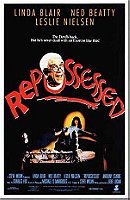
 124
124
 4.8
4.8
 4.8
4.8
